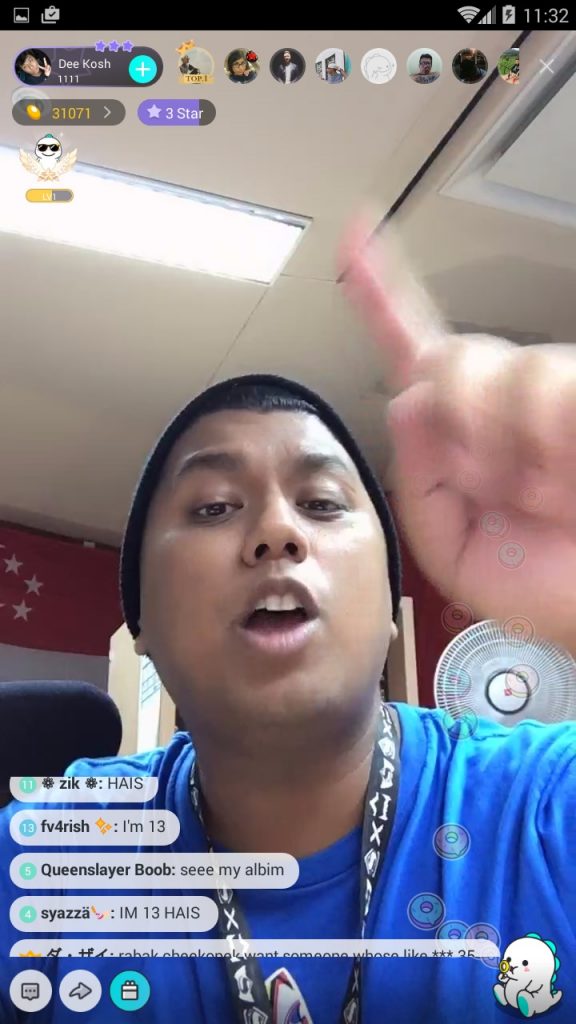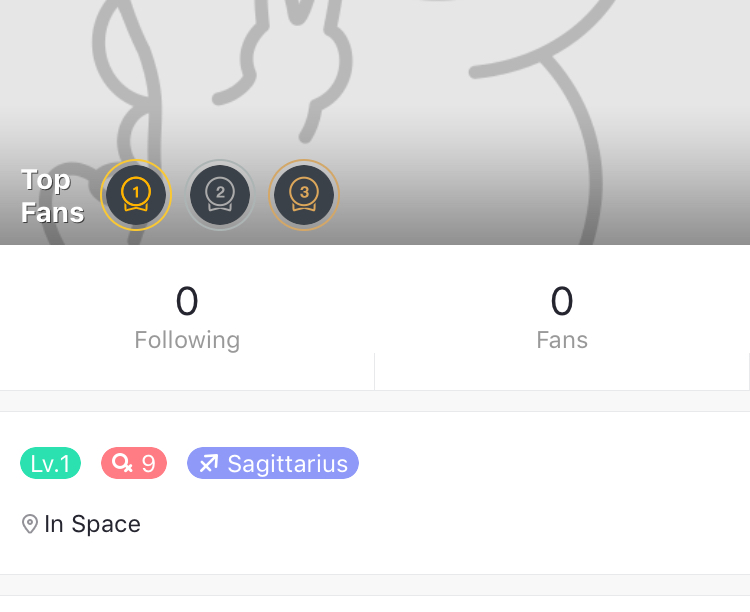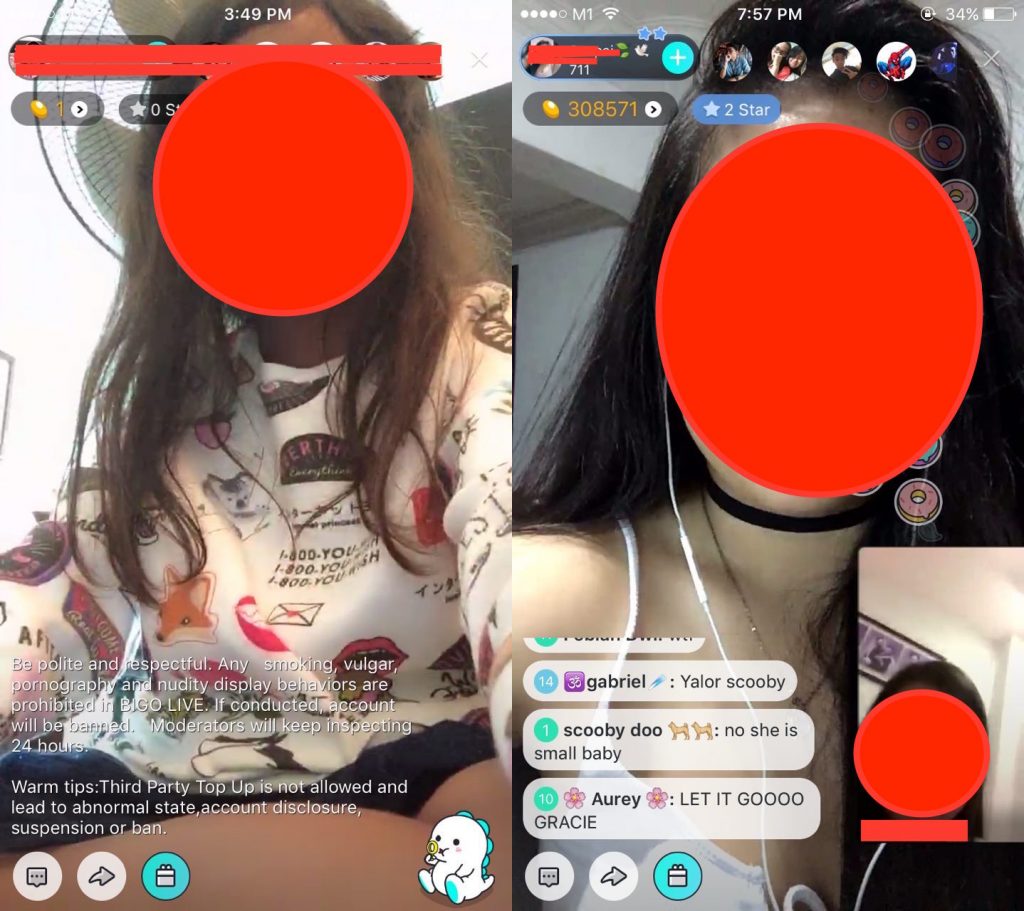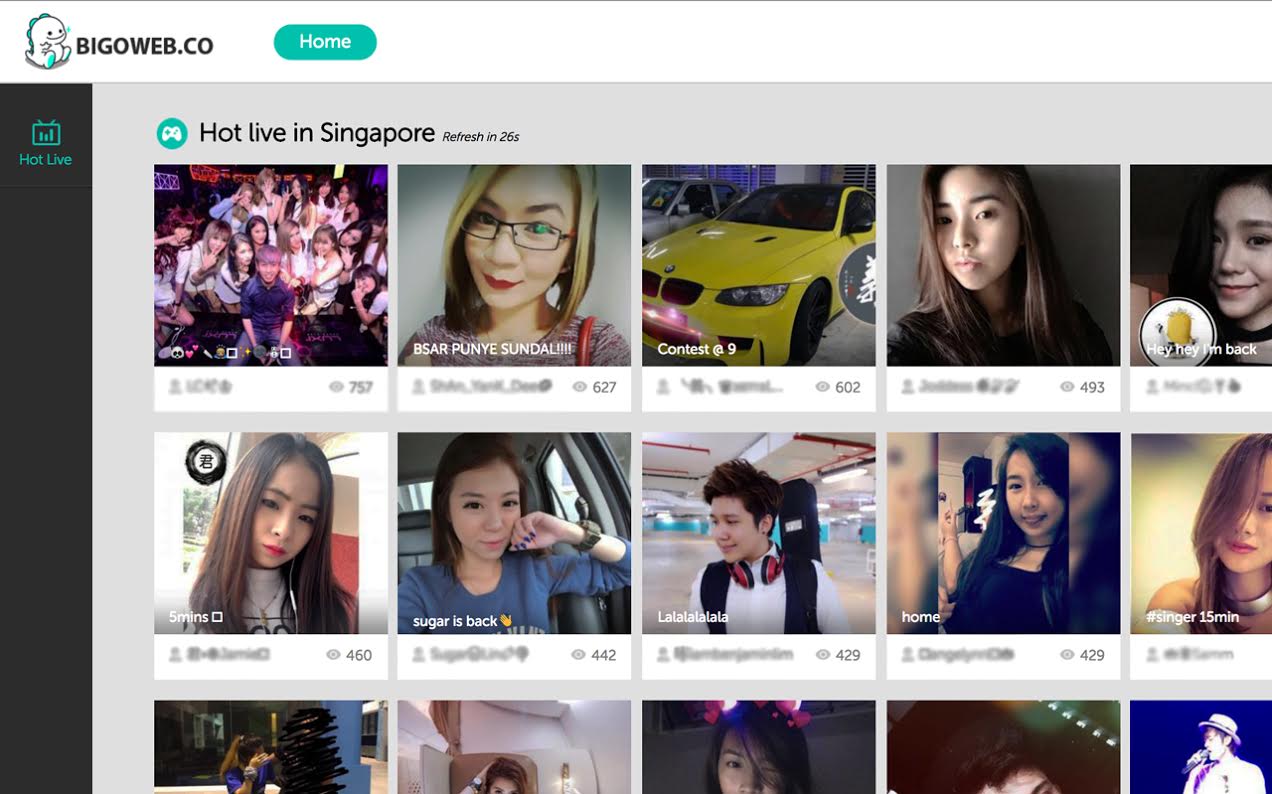Image credit: Bigo Live
“All I do is tell the truth,” says Singaporean DJ and Youtube personality Dee Kosh to his audience on Bigo.
“The internet, is full of freaks.”

It’s sometime after 10 PM on a Tuesday night and there are over 1000 users tuning in to his stream. He goes on.
“When I run into parents who tell me their children watch my stream and my videos, I get very happy. So I ask them how old their kids are. I’m expecting them to say 16 or 17. Instead they tell me 12 or 13. And I’m thinking, why are your children watching my stream? I curse and swear and everything on it!”

We can’t help but agree with Dee Kosh. No Bigo user should be this young. Even Bigo’s Terms of Service require all users to be at least 21 years of age.
Despite this, the app itself doesn’t require you to verify your age. If you sign up as a 9 year old girl like we did, nothing happens. It didn’t even prompt us to prove that we had permission from our “parents” to be on this, in accordance with what its Terms of Service require.
If there are no parental controls, how does Bigo intend to enforce its Terms of Service?
At best, there is a reminder within the app to be polite and respectful, and states that “any smoking, vulgar, pornography and nudity display behaviours are prohibited.” To an extent, this warning is honoured by users. Users themselves serve as moderators, so one gentleman who was allegedly touching himself through his clothes had his account banned within minutes (albeit for just a short while). Even then, many get away with dressing provocatively, smoking, and swearing on their streams.

All of this creates the impression that Bigo has succeeded in establishing a safe space of sorts—a kind of social media on which even people who are unpopular in real life can find an audience.
But the truth is, Bigo takes little responsibility for anything that happens as a result of your use of the app.
Its Terms of Service includes a legal template (amongst others) which states, “You agree to bear all the risks and take full legal liability for the following activities while using the Site or Services,” which includes everything from slander to terrorism and murder.
This contrasts starkly with other social media platforms such as Facebook which at least states that they will “do their best to keep Facebook safe.” While they can’t guarantee the safety of its users, they make a commitment to it, unlike Bigo which seems to pass the buck to its users.
Of greater concern is the section of Bigo’s Terms of Service which states that users should “refrain from spreading … any damage to third party” and so on. ‘Refrain’ is not the same as an absolute ban, like how Facebook has clear rules which state in no uncertain terms that “you will not …” bully, intimidate or harass other users and so on.
It’s quite clear from the above that Bigo doesn’t take as much responsibility for its users’ safety as it should. This is all fine and well save for the fact that there are kids who are using the app, and it’s highly likely that users under the age of 16 will not fully understand the risks they are agreeing to.
Perhaps more alarming is the fact that on Bigo, anyone can watch anyone without their consent. This is made worse by how the app doesn’t ban the use of third party applications like NOX from recording videos or pictures, creating a fertile breeding ground for children to be exploited by sexual predators (or worse).

A Bigo user who spoke to us on the condition of anonymity told us that all kinds of things have happened on Bigo’s live streams.
In one incident, our source spotted a user crying on her live feed and talking about using a banned substance. Commenters were warning her not to over-dose, and it’s unclear if she had or hadn’t actually taken anything. Our source had then gone to bed, and about 5 or 6 hours later, he awoke to see her live streaming from a hospital.
“I’m waiting to have my stomach pumped,” the streamer said in Chinese, dressed in a pink hospital gown. She then went on to talk about wanting to commit suicide. At one point, she mentioned that she was having difficulties breathing but said that she didn’t want to call the nurse.
He also told us about a guy who streamed himself lamenting how his girlfriend had been caught, on stream, leaving the house of another man. The funny thing, our source pointed out, was that he didn’t seem to be complaining about this to his friends. Instead, it was the Bigo community he turned to.
It’s then fair to ask, is this the kind of content you want your kids to be tuning in to?

The thing is, Bigo is built on fandom, where users obsessively follow the lives of other users. This is particularly dangerous when everyone is young and they all want to feel included. It puts pressure on both streamers and viewers alike.
Streamers who love the attention are driven to fill their lives with drama to keep viewers hooked. To win more attention and a bigger audience, they do things they might never have done before. For viewers, it’s all about pleasing their favourite streamers in order to obtain any kind of response that would make them feel special.
For both sides, streaming and watching everyday like clockwork is not mere routine. It’s the platform on which their lives truly happen.
Underlying this is also a whole financial network. Users use real cash to buy Diamonds which are then used to buy and send gifts to streamers. A gift like a Roadster (a fake in-app car), for instance, costs about 120 USD worth of Diamonds. In exchange for this Roadster, streamers receive 3000 Beans which they can cash in for about 20 USD. The difference of 100 USD goes to Bigo.

At one point in his monologue, Dee Kosh seemed to concede a little when he said that if you’re 12 or 13, “I guess it’s okay if you want to watch, but you definitely shouldn’t be streaming.”
But given what happens on the app, and a user agreement that clearly does not prioritise the well-being of users, we can’t find it in ourselves to agree.
If Bigo is indeed a voyeur’s dream, an app widely known to be used for anonymously ogling girls and guys alike, then Bigo is no place for kids.
As it is, it’s appalling that even the most basic safeguards are not in place on the app. While parents aspire to give their children the autonomy to play and discover new things, apps like Bigo make it extremely difficult to do so. They make a lot of us cynical and scared, all while forcing its own users into online cocoons where they can be safe as long as they play by its rules.
If you have a friend or a family member who’s on Bigo but isn’t 16 or older, it’s time to get them off the app.






